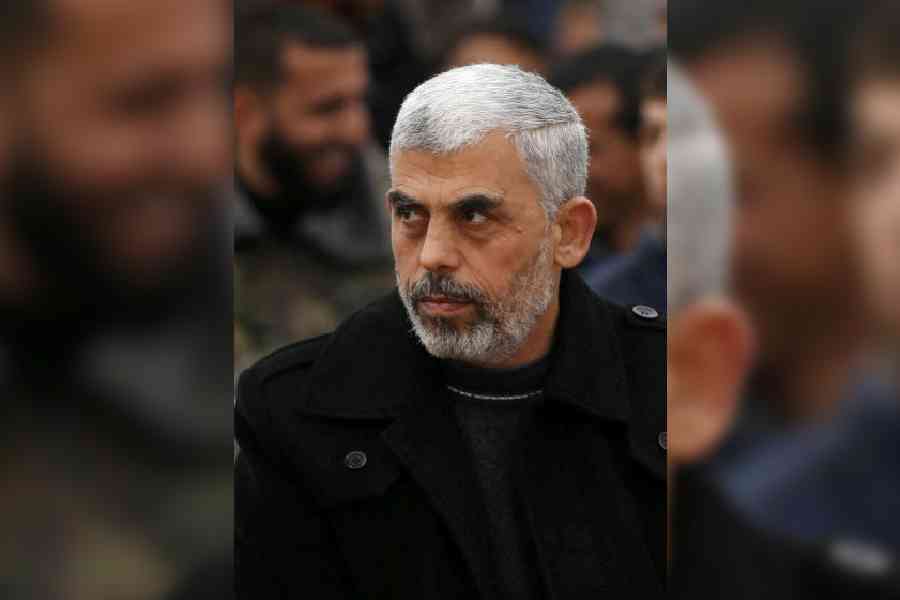After Hamas attacked Israel in October, igniting the Gaza war, Israeli leaders described the group’s most senior official in the territory, Yahya Sinwar, as a “dead man walking”.
Considering him an architect of the raid, Israel has portrayed Sinwar’s assassination as a major goal of its devastating counterattack.
Seven months later, Sinwar’s survival is emblematic of the failures of Israel’s war, which has ravaged much of Gaza but left Hamas’s top leadership largely intact and failed to free most of the captives taken during the October attack.
Even as Israeli officials seek his killing, they have been forced to negotiate with him, albeit indirectly, to free the remaining hostages. Sinwar has emerged not only as a strong-willed commander but as a shrewd negotiator who has staved off an Israeli battlefield victory while engaging Israeli envoys at the negotiating table, according to officials from Hamas, Israel and the US. Some spoke on the condition of anonymity to discuss sensitive intelligence assessments of Sinwar and diplomatic negotiations.
While the talks are mediated in Egypt and Qatar, it is Sinwar — believed to be hiding in a tunnel network beneath Gaza — whose consent is required by Hamas’s negotiators before they agree to any concessions, according to some of those officials.
Hamas officials insist that Sinwar does not have the final say in the group’s decisions. But though Sinwar does not technically have authority over the entire Hamas movement, his leadership role in Gaza and his forceful personality have given him outsize importance in how Hamas operates, according to allies and foes alike.
“There’s no decision that can be made without consulting Sinwar,” said Salah al-Din al-Awawdeh, a Hamas member and political analyst who befriended Sinwar while they were both jailed in Israel during the 1990s and 2000s. “Sinwar isn’t an ordinary leader, he’s a powerful person and an architect of events. He’s not some sort of manager or director, he’s a leader,” al-Awawdeh added.
Sinwar has rarely been heard since the start of the war, unlike Hamas officials based outside Gaza, including Ismail Haniyeh, the movement’s most senior civilian official. Though he is nominally junior to Haniyeh, Sinwar has been central to Hamas’s behind-the-scenes decision to hold out for a permanent cease-fire, American and Israeli officials say.
Waiting for Sinwar’s approval has often slowed the negotiations, according to officials and analysts. Israeli strikes have damaged much of Gaza’s communications infrastructure, and it has sometimes taken a day to get a message to Mr. Sinwar and a day to receive a response, according to US officials and Hamas members.
For Israeli and Western officials, Sinwar has over the course of these negotiations, which stalled again in Cairo this past week, emerged as both a brutal adversary and a deft political operator, capable of analysing Israeli society and appearing to adapt his policies accordingly.
As an architect of the October 7 attacks, Sinwar masterminded a strategy that he knew would provoke a ferocious Israeli response. But in Hamas’s calculus, the deaths of many Palestinian civilians — who do not have access to Hamas’s subterranean tunnels — were the necessary cost of upending the status quo with Israel.
American and Israeli intelligence agencies have spent months assessing Sinwar’s motivations, according to people briefed on the intelligence. Analysts in both the US and Israel believe that Sinwar is primarily motivated by a desire to take revenge on Israel and weaken it. The well-being of the Palestinian people or the establishment of a Palestinian state, the intelligence analysts say, appears to be secondary.
Sinwar was born in Gaza in 1962 to a family that had fled its home, along with several hundred thousand other Palestinian Arabs who fled or were forced to flee during the wars surrounding the creation of the state of Israel.
Sinwar joined Hamas in the 1980s. He was later imprisoned for murdering Palestinians whom he accused of apostasy or collaborating with Israel, according to Israeli court records from 1989. Sinwar spent more than two decades in Israeli detention before being released in 2011, along with more than 1,000 other Palestinians, in exchange for one Israeli soldier captured by Hamas. Six years later, Sinwar was elected leader of Hamas in Gaza.
While in prison, Sinwar learned Hebrew and developed an understanding of Israeli culture and society, according to fellow former inmates and Israeli officials who monitored him in prison. Sinwar now appears to be using that knowledge to sow divisions in Israeli society and heighten pressure on Benjamin Netanyahu, the Israeli Prime Minister, according to Israeli and US officials.
They believe that Sinwar has timed the release of videos of some Israeli hostages in order to spur public outrage at Netanyahu during crucial phases of the cease-fire talks.
Some Israelis want the remaining hostages released even if it means agreeing to Hamas’s demands for a permanent truce that would keep the group — and Sinwar — in power. But Netanyahu has been reluctant to agree to end the war.
If Netanyahu has been accused of dragging out the fighting for personal benefit, so, too, has his archenemy, Sinwar.
New York Times News Service











